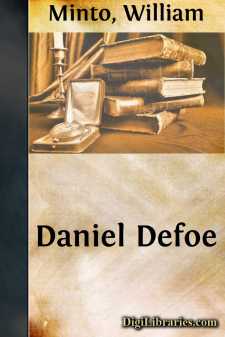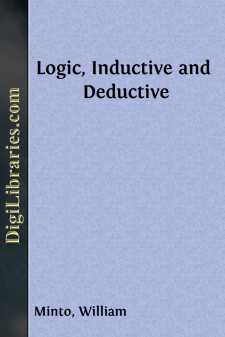Categories
- Antiques & Collectibles 13
- Architecture 36
- Art 48
- Bibles 22
- Biography & Autobiography 813
- Body, Mind & Spirit 142
- Business & Economics 28
- Children's Books 16
- Children's Fiction 13
- Computers 4
- Cooking 94
- Crafts & Hobbies 4
- Drama 346
- Education 46
- Family & Relationships 57
- Fiction 11829
- Games 19
- Gardening 17
- Health & Fitness 34
- History 1377
- House & Home 1
- Humor 147
- Juvenile Fiction 1873
- Juvenile Nonfiction 202
- Language Arts & Disciplines 88
- Law 16
- Literary Collections 686
- Literary Criticism 179
- Mathematics 13
- Medical 41
- Music 40
- Nature 179
- Non-Classifiable 1768
- Performing Arts 7
- Periodicals 1453
- Philosophy 64
- Photography 2
- Poetry 896
- Political Science 203
- Psychology 42
- Reference 154
- Religion 513
- Science 126
- Self-Help 84
- Social Science 81
- Sports & Recreation 34
- Study Aids 3
- Technology & Engineering 59
- Transportation 23
- Travel 463
- True Crime 29
Daniel Defoe
by: William Minto
Categories:
Description:
Excerpt
CHAPTER I.
DEFOE'S YOUTH AND EARLY PURSUITS.
The life of a man of letters is not as a rule eventful. It may be rich in spiritual experiences, but it seldom is rich in active adventure. We ask his biographer to tell us what were his habits of composition, how he talked, how he bore himself in the discharge of his duties to his family, his neighbors, and himself; what were his beliefs on the great questions that concern humanity. We desire to know what he said and wrote, not what he did beyond the study and the domestic or the social circle. The chief external facts in his career are the dates of the publication of his successive books.
Daniel Defoe is an exception to this rule. He was a man of action as well as a man of letters. The writing of the books which have given him immortality was little more than an accident in his career, a comparatively trifling and casual item in the total expenditure of his many-sided energy. He was nearly sixty when he wrote Robinson Crusoe. Before that event he had been a rebel, a merchant, a manufacturer, a writer of popular satires in verse, a bankrupt; had acted as secretary to a public commission, been employed in secret services by five successive Administrations, written innumerable pamphlets, and edited more than one newspaper. He had led, in fact, as adventurous a life as any of his own heroes, and had met quickly succeeding difficulties with equally ready and fertile ingenuity.
For many of the incidents in Defoe's life we are indebted to himself. He had all the vaingloriousness of exuberant vitality, and was animated in the recital of his own adventures. Scattered throughout his various works are the materials for a tolerably complete autobiography. This is in one respect an advantage for any one who attempts to give an account of his life. But it has a counterbalancing disadvantage in the circumstance that there is grave reason to doubt his veracity, Defoe was a great story-teller in more senses than one. We can hardly believe a word that he says about himself without independent confirmation.
Defoe was born in London, in 1661. It is a characteristic circumstance that his name is not his own, except in the sense that it was assumed by himself. The name of his father, who was a butcher in the parish of St. Giles, Cripplegate, was Foe. His grandfather was a Northamptonshire yeoman. In his True Born Englishman, Defoe spoke very contemptuously of families that professed to have come over with "the Norman bastard," defying them to prove whether their ancestors were drummers or colonels; but apparently he was not above the vanity of making the world believe that he himself was of Norman-French origin. Yet such was the restless energy of the man that he could not leave even his adopted name alone; he seems to have been about forty when he first changed his signature "D. Foe" into the surname of "Defoe;" but his patient biographer, Mr. Lee, has found several later instances of his subscribing himself "D. Foe," "D.F.," and "De Foe" in alternation with the "Daniel De Foe," or "Daniel Defoe," which has become his accepted name in literature....



